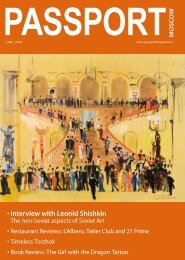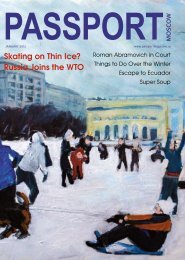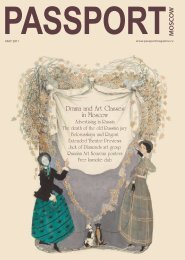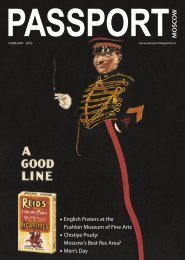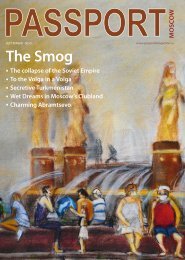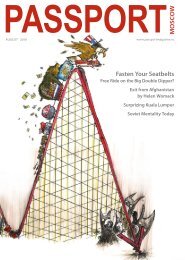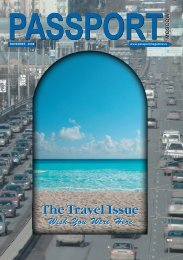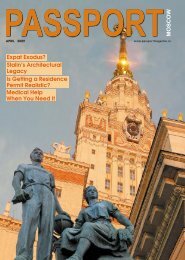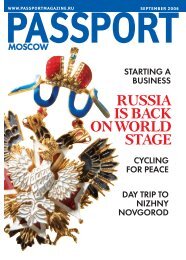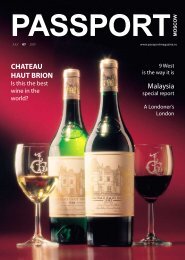Create successful ePaper yourself
Turn your PDF publications into a flip-book with our unique Google optimized e-Paper software.
California<br />
Preening<br />
Ian Mitchell<br />
In the middle of a Moscow winter, there<br />
will be many who dream of California,<br />
the west coast American oblast which is<br />
run by The Terminator, and where whitecollar<br />
desk-jockeys in sweats generate<br />
electricity for the local grid by peddling<br />
exercise bikes in their lunch hour. But<br />
that is not all that happens California. Los<br />
Angeles also happens.<br />
Raymond Chandler once described the<br />
city as having “all the personality of a paper<br />
cup” and it would seem that Bret Easton Ellis<br />
feels much the same, despite the glitter,<br />
the sunshine and the slender, swaying palm<br />
trees, many of which are even taller than<br />
Naomi Campbell. And Mr Ellis should know:<br />
he has written two novels about the place.<br />
The first of Mr Ellis’s books, called Less<br />
Than Zero, was published in 1985, when<br />
he was still a brattish college kid in temporary<br />
exile in Vermont. He returns to<br />
his home-town for a socially-dysfunctional<br />
Christmas. The first sentence sets<br />
the tone: “People are afraid to merge on<br />
freeways in Los Angeles.”<br />
Two hundred pages later, the book<br />
ends without anyone having merged, on<br />
a freeway or anywhere else. They have<br />
passed in the night, exchanging bodyfluids,<br />
joints and occasionally blows. But<br />
they have never merged because they,<br />
like the author, are too self-centred to<br />
be able to establish genuinely interactive<br />
relationships with other items in the<br />
city’s human inventory.<br />
How dull, you might think, especially<br />
while sitting in the land of Leo Tolstoy.<br />
But Mr Ellis’s books are not dull—that is<br />
the point. He has raised to a high pitch<br />
of art, the illustration of isolation. His stories<br />
do not really present a plot, except<br />
in very minimalist way. They are vehicles<br />
for the expression of a single self. All the<br />
characters in them are, at bottom, the<br />
same, or at least trying to be the same<br />
thing behind variations of wardrobe and<br />
lifestyle accessory. Complete freedom<br />
produces competitive conformity.<br />
I mention Less Than Zero because the<br />
book under review, Imperial Bedrooms,<br />
published six months ago, revisits the same<br />
places, the same group of people and the<br />
same background cultural assumptions<br />
twenty-five years on. The powerful beams<br />
of self-absorption and narcissism are undimmed.<br />
Everyone is still projecting, preening<br />
and pooh-poohing all those who do<br />
not project so powerfully or preen so conscientiously.<br />
And still they do not merge.<br />
They have grown up without maturing.<br />
In the intervening quarter of a century,<br />
Mr Ellis himself left college, got stoned<br />
several thousand times and published five<br />
books. One of them was, I thought, a dud;<br />
two were interesting; and two were brilliant.<br />
The first of the latter category was<br />
American Psycho, the book for which he<br />
is best known, and which, like Less Than<br />
Zero, was made into a very successful film.<br />
Best of all was Glamorama, the book<br />
about the fashion/night-club world in<br />
New York. When I re-read it recently, I<br />
found myself thinking that it made Anna<br />
Karenina, which I was reading at the<br />
same time, seem lifeless by comparison.<br />
Granted, Tolstoy has a plot and a variety<br />
of interesting characters, whereas Bret<br />
Easton Ellis has little plot and really only<br />
one character: himself (again). But there<br />
is a vigour, a wit, a readability and a crispness<br />
of social observation that is far more<br />
entertaining than anything that the Sage<br />
of the Tulskaya oblast presents in his extended<br />
saga of social reportage.<br />
In Anna Karenina people “merge”, demerge,<br />
change and realise things. They<br />
regularly think about other people. In<br />
Glamorama they are more likely to stop<br />
on the staircase in night-clubs they are<br />
designing and ask: “Is this cool or useless?<br />
I’m not sure.” Conversations fall apart: “A<br />
long, chilly silence none of us are able to<br />
fill floats around, acts cool, lives.” (emphasis<br />
in original) The author-narrator’s motto<br />
is: “The better you look, the more you see.”<br />
So when someone unbeautiful “acts like<br />
an idiot without trying”, he cuts him off by<br />
saying, “Oh sorry, my ass just yawned.”<br />
Imperial Bedrooms<br />
Bret Easton Ellis<br />
Picador £16.99<br />
The central theme of all Mr Ellis’s books<br />
is stated succinctly by the character in<br />
Glamorama who looks superciliously<br />
round the night-club the author-narrator<br />
has created and says: “I’m thinking,<br />
Jesus, the zeitgeist’s in limbo.”<br />
Even the literary world is dismissed<br />
rather wittily. When a beautiful girl the<br />
narrator is trying to “merge” with while<br />
crossing the Atlantic on the QE2 is discovered<br />
sunning herself on deck, he<br />
eases himself down onto a towel beside<br />
her, “flexing my abs to get her attention”.<br />
Unusually, he notices something not<br />
connected with himself: “She’s reading<br />
a book with the words MARTIN AMIS in<br />
giant black letters on the cover and I’m<br />
hoping she’s not a member of Amnesty<br />
International.”<br />
In order not to spoil the fun, I will say<br />
no more about Imperial Bedrooms<br />
than that, though quieter, it is an explicit<br />
continuation of all the above. The<br />
central theme is elliptically re-stated by<br />
the author-narrator, who is now a<br />
script-writer, and who repels the crowd<br />
at the after-party of a movie premier<br />
on Hollywood Boulevard with a neat<br />
reversal of a well-known cliché. Seeing<br />
the socially-greedy faces of unfamiliar<br />
people illuminated by the lights of their<br />
cell-phone screens as they preen and<br />
dream in the cavernous darkness, he<br />
declines to take verbal interchange<br />
into the unfamiliar territory of actual<br />
conversation. “I’ve been in New York<br />
the last four months is the mantra, my<br />
mask an expressionless smile.” P<br />
January 2011<br />
Book review



